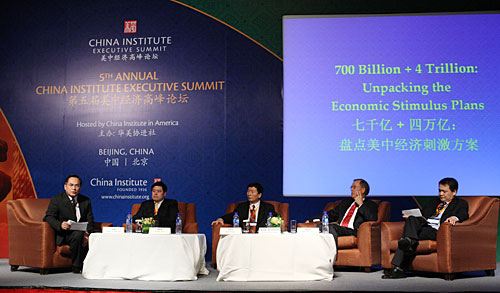|
 |
|
JOINING HANDS: The China Institute Executive Summit in Beijing on April 27-28 provides a forum for economists and business leaders from China and the United States to weigh their cooperation in fighting the economic crisis (JIANG XIAOYING) |
But one common challenge confronting the two economies is that U.S. consumers, whose retirement accounts and home values have seen significant drops in value, will be more prone to saving money than spending it in the years to come, said Donald H. Straszheim, Managing Principal with Straszheim Global Advisors Inc., at the summit. Straszheim Global Advisors is a U.S.-based independent economic research firm that focuses on business strategies in the two economies.
With the large amount of excess capacity built up during the past boom times yet to be digested, reduced consumer demand for products will make a dent in both economies, Straszheim said.
In response, China is widely expected to rebalance its economy away from its current dependence on exports and toward private consumption, while the United States must shore up its investments since it cannot afford another round of over-leveraged household spending.
Economists at the summit welcomed China's push into innovative and high-value industries, as well as the government's efforts to build a viable social safety net that could spark a surge in domestic consumption. A higher rate of precautionary savings in the United States also would help restore the household balance sheet and provide a floor under the buckling financial system, they said. The entrenched consumption-savings imbalances between the two economies must be gradually redressed, they added.
Yet, the road to economic revitalization will not be smooth sailing. China's economic growth, without a vibrant export engine, may no longer be able to operate in high gear, because the country's consumer market still needs time to grow, Straszheim said. The United States, in turn, will have to cope with a shortage of fiscal ammunition to jumpstart the economy, he said. It also faces questions about how to address the problems of monetary, credit and asset restructuring to repair its tattered financial system, he added.
"We should join hands to evolve with a new foundation for future growth," Straszheim said. "There is a real need for continuous cooperation between us to overcome those challenges together."
Zhu Min, Vice President of Bank of China Ltd. (BOC), echoed Straszheim's opinion, citing the Sino-U.S. Strategic Economic Dialogue as an important stage for coordination.
"Never before have we been so close to each other," he said. "The first step of cooperation should be to enhance our mutual understanding and policy transparency in a concerted effort to temper the growing slack."
Norman Yen, Board Advisor of SmithStreetSolutions Consulting Co. Ltd., a Shanghai-based knowledge process outsourcing firm, said coordination may be difficult for the two economies, which have their own preoccupations, but the dialogue serves as a good start.
Opportunities on the horizon
Although it came as a heavy blow to the Chinese economy, the global downturn has been more of a double-edged sword whose upside has started to shine through.
Now is a good time for the country to nurture a consumption-driven growth model that is more sustainable and efficient in both economic and environmental terms, said Yen. To achieve that, more meat must be added to the bones of industrial restructuring plans, and the government must ensure that quality plans are implemented, he said.
For China's ambitious enterprises, the downturn also provides them with a rare opportunity to become more globally competitive. Through outbound organic expansion or cross-border mergers and acquisitions, they can get access to advanced technologies, raw materials, marketing and distribution channels, global brands and global management teams.
| 